|
|
|
Sort Order |
|
|
|
Items / Page
|
|
|
|
|
|
|
| Srl | Item |
| 1 |
ID:
168403
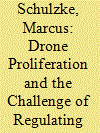

|
|
|
|
|
| Summary/Abstract |
The controversy surrounding military drones has generated many proposals for restricting or prohibiting existing drones, additional autonomous variants that may be created in the future, and the sale of drones to certain markets. Moreover, there is broad interest in regulating military drones, with proposals coming not only from academics but also from NGOs and policymakers. I argue that these proposals generally fail to consider the dual-use character of drones and that they therefore provide inadequate regulatory guidance. Drones are not confined to the military but rather spread across international and domestic security roles, humanitarian relief efforts, and dozens of civilian applications. Drones, their component technologies, the control infrastructure, and the relevant technical expertise would continue to develop under a military-focused regulatory regime as civilian technologies that have the potential to be militarized. I evaluate the prospects of drone regulation with the help of research on other dual-use technologies, while also showing what the study of drones can contribute to that literature. Drones’ ubiquity in nonmilitary roles presents special regulatory challenges beyond those associated with WMDs and missiles, which indicates that strict regulatory controls or international governance frameworks are unlikely to succeed. With this in mind, I further argue that future research should acknowledge that drone proliferation across military and civilian spheres is unavoidable and shift focus to considering how drone warfare may be moderated by countermeasures and institutional pressures.
|
|
|
|
|
|
|
|
|
|
|
|
|
|
|
|
| 2 |
ID:
168396


|
|
|
|
|
| Summary/Abstract |
The literature on environmental peacemaking claims that groups in conflict can put aside their differences and cooperate in the face of shared environmental challenges, thereby facilitating more peaceful relations between them. This study provides the first comprehensive review of the widely dispersed empirical evidence on such environment-peace links. In order to do so, it distinguishes three understandings of peace and identifies four mechanisms connecting environmental cooperation to peace. The results suggest that environmental cooperation can facilitate the absence of violence within states as well as symbolic rapprochement within and between states, although such links are strongly dependent on the presence of several contextual factors. The most relevant mechanisms connecting environmental cooperation to peace are an increase in understanding and trust and especially the build-up of institutions. By contrast, environmental peacemaking is unlikely to have an impact on substantial integration between states or groups. Based on these findings, the article offers four suggestions for future research: (i) assess the relevance of environmental cooperation vis-à-vis other (presumably less context-dependent) drivers of peacemaking, (ii) pay more attention to the mechanisms connecting environmental cooperation to peacemaking, (iii) focus on the interactions between and the different time horizons of the three understandings of peace, and (iv) study the downside of environmental peacemaking to provide a more nuanced assessment and identify further relevant contextual factors.
|
|
|
|
|
|
|
|
|
|
|
|
|
|
|
|
| 3 |
ID:
168399
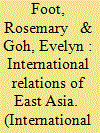

|
|
|
|
|
| Summary/Abstract |
East Asia is a region of signal importance for global order because of its economic dynamism and growing heft, China's challenge to the United States as incumbent regional and global hegemon, and other conflict hotspots like the Korean peninsula. This requires academic analysis that both appreciates the subtleties inherent to this region and can relate them to the wider systemic context. Many analysts have begun to allude to the challenging characteristics that are present in the international relations of East Asia, in particular struggling to explain how growing levels of economic interdependence can coexist with heightened security tensions. This article offers a research prospectus that suggests ways of analyzing these apparently contradictory trends. It proposes the development of research questions and approaches that are more suited to studying the international relations of a region with characteristics that we define as dual, hybrid, and contingent. We propose a Conjunctions Analytical Framework that explores what happens at the conjunctions of the regional-global and the unit-regional/global levels of analysis—the “grey areas” where social formations meet and interact. We aim to help shape the future study of the IR of East Asia and to suggest more effective ways of analyzing the complex reality of East Asia's regional and global politics.
|
|
|
|
|
|
|
|
|
|
|
|
|
|
|
|
| 4 |
ID:
168397
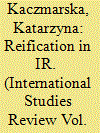

|
|
|
|
|
| Summary/Abstract |
This article studies the contentious problem of reification in international relations (IR) on the example of the idea of international society. It shows how the idea became reified, that is, how the move was made from approaching international society as one of several competing frameworks for the study of international politics to considering it an objective fact, a self-evident reality of international politics, and an entity in the possession of agency. For this purpose, I trace key writings of the English school and survey their contribution to the idea’s development and gradual reification. I posit that reification has been the outcome of individual strategies and disciplinary practices pertaining to the knowledge production process, in particular the perceived need to establish and maintain a research program while continuing to provide viable explanations of world events. In discussing the consequences, I argue that reification adversely affects not only research outcomes but also the study process. A reified category, once it becomes a default language through which to think and talk about international politics, narrows down avenues for diverging interpretations of international politics. Furthermore, endowing international society with agency hides real agents behind specific actions in international politics.
|
|
|
|
|
|
|
|
|
|
|
|
|
|
|
|
| 5 |
ID:
168400


|
|
|
|
|
| Summary/Abstract |
Many scholars are dissatisfied with the tendency of research and teaching in the field of international relations to be framed as clashes among competing schools of thought. I examine two prominent options for reform that relate to the schools and offer one element of an alternative path forward. The first option, which I term analytical singularism, calls for the abandonment of the IR schools and their replacement with a single, uniform framework for the study of international relations. By virtue of a constricted ontology and partialist epistemology, this option is plagued by omitted variable bias and underspecified modeling of important international processes. The second option, analytical eclecticism, suggests that improved IR studies might emerge from the consideration of interactions between causal factors that are drawn from the different IR schools of thought. Analytical eclecticism holds promise but faces serious challenges arising from its preference for qualitative methods and context-specific epistemology. I then outline a process of collaborative challenges between adherents of the different IR schools as one way by which we might advance research in international relations.
|
|
|
|
|
|
|
|
|
|
|
|
|
|
|
|
| 6 |
ID:
168401


|
|
|
|
|
| Summary/Abstract |
Half a century after the “Second Great Debate” in international relations (IR) started, scholars still perceive the qualitative versus quantitative division as their principal divide, and yet we do not have a good grasp of the impact of this divide. My research explores how the divide shaped the incentives and behaviors of scholars and influenced the organization of our academic communities and knowledge production. The impact of the divide expressed itself in the distribution of research among methodologies in terms of relative quantity and impact. Less obviously, and yet more importantly, the divide influenced the distribution of quantitative research among different institution types, across fields and journals, and with respect to policy engagement. Using the TRIP database of 7,792 IR articles in twelve top journals from 1980 to 2014, I classify journal articles into three categories—quantitative-only, qualitative-only, and mixed-methods—and categorize author institutions into similar types—publishing quantitative research only, producing nonquantitative work only, and publishing various proportions of quantitative research. Notably, qualitative and quantitative works switched positions over time in terms of relative quantity and impact, with quantitative research more likely published but only slightly more cited in the recent decade. More importantly, the divide produced other less obvious but more serious outcomes. Among 1,111 institutions that ever published IR research in twelve top journals over thirty-five years, two-thirds published nonquantitative research only; fifty-three institutions published more than half of all quantitative articles; institutions publishing quantitative-only or nonquantitative-only research constituted two modal categories. Political science journals published more quantitative research, persistently and with growing convergence; IR journals also evolved toward publishing more quantitative research though with persistent divergence and forming two clusters. Quantitative articles and political science journals were significantly less engaged in providing policy prescriptions than qualitative articles and IR journals. To overcome this lasting and self-perpetuating divide, we must better understand its impact, learn to appreciate alternative approaches, and change the way we train future scholars.
|
|
|
|
|
|
|
|
|
|
|
|
|
|
|
|
| 7 |
ID:
168398
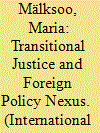

|
|
|
|
|
| Summary/Abstract |
How does an approach towards transitional justice produce preconditions for a country's international action, enabling certain policies and practices in the immediate neighborhood and international society at large? This article unpacks ontological security-seeking as a generic social mechanism in international politics, which makes it possible to productively conceptualize the connection between a state's transitional justice and foreign policies. Going beyond the dichotomy of transitional justice compliance and noncompliance by gauging the role of states’ subjective sense of self in driving their behavior, I develop an analytical framework to explain how state ontological security-seeking relates to major transitions and consequent state identity disjuncture, the ensuing politics of truth-and-justice-seeking, and its international resonance in framing and executing particular foreign policies. I offer a typology of the international consequences of states’ transitional justice politics, distinguishing between reflective and mnemonical security-oriented approaches, spawning cooperative and conflictual foreign policy behavior, respectively. The empirical purchase of the purported nexus is illustrated with the example of post-Soviet Russia's limited politics of accountability toward the repressions of its antecedent regime and its increasingly self-assertive and confrontational stance in contemporary international politics.
|
|
|
|
|
|
|
|
|
|
|
|
|
|
|
|
| 8 |
ID:
168402


|
|
|
|
|
| Summary/Abstract |
Human activities taking place as part of postwar globalization have had a profound and intensifying impact on the global environment. In turn, global environmental change (GEC) is becoming an increasingly influential force in shaping the global political economy, with wide-ranging impacts on trade, finance, development, growth, governance, and interstate relations. This article examines how GEC is described and explained to students of international political economy (IPE), by reviewing the field's most influential survey texts. It finds that while most of the texts reflect the broader field's approach to GEC fairly accurately (in depicting GEC as an “emerging issue” warranting further study), this article problematizes this framing and argues that GEC ought to be given more urgent attention. That is, despite offering a tacit understanding of GEC's increasing influence as a central force shaping the global political economy (and vice versa), there remains an opportunity to better explain this dialectic to students within the field's primary texts.
|
|
|
|
|
|
|
|
|
|
|
|
|
|
|
|
| 9 |
ID:
168404
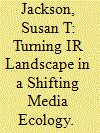

|
|
|
|
|
| Summary/Abstract |
Each year the prevalence of digitized information becomes more entrenched, not least with the amount of activity on social media. Yet, new media studies pose a number of challenges to international relations scholarship, which are only beginning to be addressed. With some exceptions IR scholars who conduct this research tend to rely on traditional qualitative methods and have been hesitant to embrace interdisciplinary collaboration—especially with those disciplines outside of the social sciences—as well as methodological pluralism across interpretive and quantitative approaches within the social sciences. This tendency shows a general lack of understanding of what new/social media might mean, not only as a source of and tool for generating information but also as a structural factor in how we conduct IR research and practice international relations. In this way, social media can provoke IR scholars to ask questions about their own discipline. This article aims to address these challenges and to provide suggestions on how to bring structural aspects of new media into IR research. In particular, it incorporates ideas centered on the shifting media ecology as fundamental to examining these structural challenges in terms of practicing international relations and in the visual turn in IR.
|
|
|
|
|
|
|
|
|
|
|
|
|
|
|
|
|
|
|
|
|